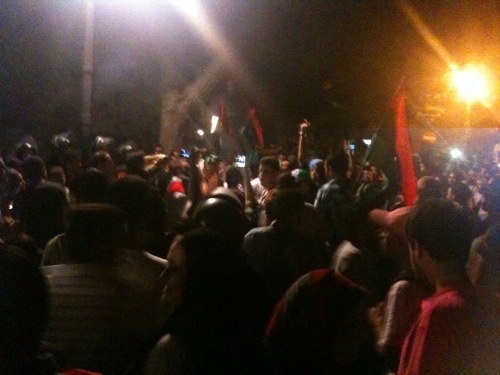Libyans celebrate in Cairo
A trio of wounded Libyan rebels hobbled down the street, one wearing an eyepatch, another lurching on his crutches. A woman wearing a full niqab had pinned a Libyan flag to her face. Exiled Libyan activists – many of whom had fled Tripoli just months earlier – rejoiced at the news of the capture of two of Qaddhafi’s sons. It was a few hours before dawn on Monday, and a few thousand Libyans had surrounded their embassy in Cairo to celebrate the fall of Tripoli, joined by a smattering of Egyptians.
Rakha Dahan, a 28-year-old make-up artist, had gotten a phone call from her mother in Tripoli informing her that rebels had reached their neighborhood. She rushed out with her infant daughter, but not before applying copious amounts of gold glitter to her cheeks. Dahan’s three brothers are fighting in Libya, as is her husband. Her father is working with the rebels in the western mountains. “We are a crazy family,” she said. “You can imagine how my mother feels.”
Fireworks and bottle rockets made deafening noise in the narrow streets of Zamalek around the embassy. Egyptian riot police formed a cordon, but dissipated when they realized the demonstrators had no intention of storming the building.
Usama Mahfouz Al-Saha, a prosecutor from Tripoli, strode over to think a trio of Egyptian activists. “Without you, we never would have made it,” he said, shaking their hands warmly. “The revolutions in Tunis and Egypt gave us the push, the feeling that we can do the same and have change in our country.”
One of the Egyptians, Amr Shebl, was beside himself; he’d been checking Twitter, watching television and updating his Facebook feed all night to get his fix of Libya news. “The smell of freedom is awesome,” he said. “I’m having the same feeling I had the day Mubarak stepped down.”
Al-Saha, the Libyan prosecutor, exuded satisfaction but also worry. He said he had planned anti-Qaddhafi demonstrations early in the uprising, and had fled to Egypt with his family when a friend in government warned him his arrest was imminent.
The tribal rivalary unleashed during the civil war could persist, Al-Saha said, but most of all he feared the bitter disputes that will begin after Qaddhafi is gone and Libyans try to reclaim property seized over the last 42 years by the state or by Qaddhafi loyalists. “This will cause chaos in the country,” Al-Saha said, as his fellow Libyans chanted and danced around him. “It will take years to sort out.”


